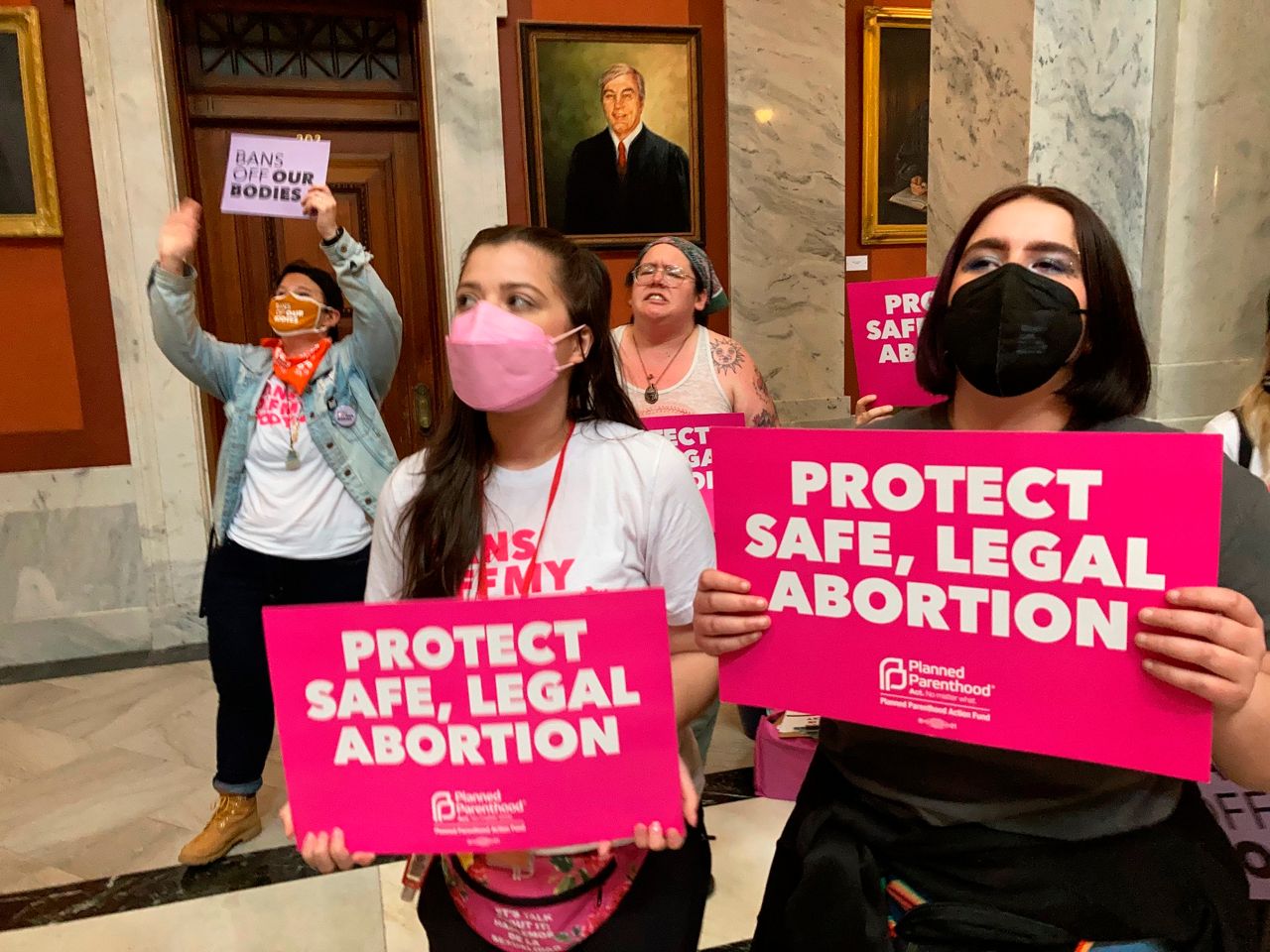Each time a Supreme Court vacancy needs to be filled, it’s a sure bet the nominee will be asked about their views on abortion. How candid they might be is another issue.
What You Need To Know
- None of the five conservative justices who have reportedly voted in favor — at least preliminarily — of overturning Roe v. Wade explicitly said during their Senate confirmation hearings they planned to do so if given the opportunity
- In some instances, their answers were evasive, as they indicated they didn’t want to prejudge any cases; other times, their responses, in hindsight, were arguably misleading
- According to Politico, Justices Samuel Alito, Amy Coney Barrett, Neil Gorsuch, Brett Kavanaugh and Clarence Thomas have voted to strike down Roe
- Sen. Susan Collins, said in a statement Tuesday that if Kavanaugh and Gorsuch have indeed voted to strike down Roe, “it would be completely inconsistent with what” the justices “said in their hearings and in our meetings in my office”
None of the five conservative justices who have reportedly voted in favor — at least preliminarily — of overturning Roe v. Wade explicitly said during their Senate confirmation hearings they planned to do so if given the opportunity. In some instances, their answers were evasive, as they indicated they didn’t want to prejudge any cases. Other times, their responses, in hindsight, were arguably misleading.
Justice Samuel Alito wrote the majority draft opinion that was leaked to POLITICO and confirmed Tuesday by Chief Justice John Roberts. According to the outlet, Justices Amy Coney Barrett, Neil Gorsuch, Brett Kavanaugh and Clarence Thomas were set to vote with Alito. All five were appointed by Republican presidents.
In his 2018 confirmation hearings, Kavanaugh said he believed the 1973 Roe v. Wade decision was “settled as precedent of the Supreme Court” and should be “entitled the respect under principles of stare decisis,” the legal doctrine that precedents should not be overturned without strong reason.
“And one of the important things to keep in mind about Roe v. Wade is that it has been reaffirmed many times over the past 45 years, as you know,” Kavanaugh added, citing the 1992 Supreme Court ruling in Planned Parenthood v. Casey that reaffirmed Roe.
Kavanaugh, however, refused to make any promises during his hearings that he would not vote to overturn Roe, saying it would violate judicial norms to do so.
While Kavanaugh’s past writings and rulings hinted he might at least vote in favor of restricting abortion rights as a justice, Gorsuch was a complete mystery during his 2017 hearings.
He had not written about abortion, nor did he rule on any abortion cases as a federal appeals court judge.
The closest thing members of the Senate Judiciary Committee had to go on was a book Gorsuch authored on euthanasia, in which he wrote, “The intentional taking of human life by private persons is always wrong.”
Asked about the book, Gorsuch told lawmakers that it also “explains the Supreme Court of the United States has held in Roe v. Wade that a fetus is not a person for purposes of the 14th Amendment.”
“Do you accept that?” Sen. Dick Durbin, D-Ill., asked Gorsuch.
“I accept the law of the land, Senator, yes,” Gorsuch replied, suggesting he, too, considered Roe to be settled.
Sen. Susan Collins, a centrist Republican from Maine who supports abortion rights, said in a statement Tuesday that if Kavanaugh and Gorsuch have indeed voted to strike down Roe, “it would be completely inconsistent with what” the justices “said in their hearings and in our meetings in my office.”
When she voted for Kavanaugh, Collins said he reassured her he considered Roe settled law, which convinced her to vote for him.
“I would not support a nominee that demonstrated hostility to Roe v. Wade because that would mean to me that their judicial philosophy did not include a respect for established decisions,” she told CNN at the time.
In 2006, Alito repeatedly refused to characterize Roe as “settled law.” He, however, said he respected precedent, especially in cases that have withstood many challenges, as Roe has.
“I think that when a decision is challenged and it is reaffirmed, that strengthens its value as stare decisis for at least two reasons,” Alito testified. “First of all, the more often a decision is reaffirmed, the more people tend to rely on it. And second, I think stare decisis reflects the view that there is wisdom embedded in decisions that have been made by prior Justices who take the same oath and are scholars and are conscientious, and when they examine a question and they reach a conclusion, I think that’s entitled to considerable respect.”
That comment stands in stark contrast with the draft opinion Alito has written.
“Roe was egregiously wrong from the start,” the draft reads. “Its reasoning was exceptionally weak, and the decision has had damaging consequences.”
In his confirmation hearings, Alito, however, left a crack in the door to suggest he might one day rule against Roe.
“I don’t want to leave the impression that stare decisis is an inexorable command because the Supreme Court has said that it is not,” he said.
Barrett and Thomas were more guarded when they were asked about abortion during their confirmation hearings.
Borrowing a page from Justice Elena Kagan’s confirmation playbook, Barrett said she would not give an opinion about precedent on any issues that were still being litigated, as abortion had been.
“It would actually be wrong and a violation of the canons (of ethics) for me to do that as a sitting judge,” Barrett said in 2020. “So if I express a view on a precedent one way or another, whether I say I love it or I hate it, it signals to litigants that I might tilt one way or another in a pending case.”
And in 1991, Thomas declined to weigh in on questions about Roe.
“I do not think that at this time that I could maintain my impartiality as a member of the judiciary and comment on that specific case,” he said in response to a question by then-Sen. Joe Biden.
When Sen. Orrin Hatch, R-Utah, asked Thomas if he knew how he’d vote on abortion cases, the Supreme Court hopeful answered: “I think it is inappropriate for any judge who is worth his or her salt to prejudge any issue or to sit on a case in which he or she has such strong views that he or she cannot be impartial.
“You have to sit,” he continued. “You have to listen. You have to hear the arguments. You have to allow the adversarial process to think. You have to be open. And you have to be willing to work through the problem.”
Collins wasn’t the only lawmaker Tuesday fuming about some of the answers the justices gave about Roe while being confirmed.
“Overturning a woman’s right to privacy and reproductive health after 50 years of case law makes clear the far right’s agenda: get Supreme Court justices who will testify at confirmation hearings that Roe v. Wade is settled law, but now vote to overturn it,” tweeted Sen. Maria Cantwell, D-Wash.
“American people are fed up with the Senate confirmation hearings and senators responding with a wink and a nod,” Rep. Steve Cohen, D-Tenn., posted on Twitter.
“Justices Kavanaugh and Gorsuch should apologize to Senator Collins for lying and Alito and Barrett should join them in apology to the American people and the United States Constitution,” he added.




